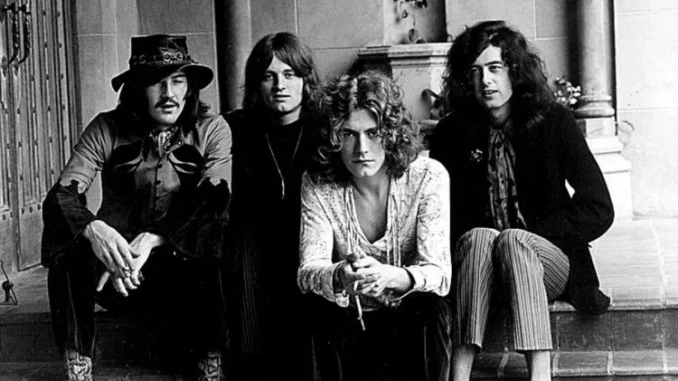
On November 8, 1971, Led Zeppelin released their iconic untitled fourth studio album, commonly known as Led Zeppelin IV. The album would go on to become one of the most celebrated and influential works in rock history, solidifying the band’s legacy as one of the greatest rock acts of all time. While the album is famous for tracks like “Stairway to Heaven” and “Black Dog,” one of the standout moments on this album is the hauntingly beautiful folk duet, The Battle of Evermore. This track, sung by Robert Plant and Sandy Denny, remains a distinctive and beloved piece of Led Zeppelin’s discography.
Unlike many of the band’s other songs, which are rooted in hard rock and blues, The Battle of Evermore showcases a softer, more ethereal side of the band, blending elements of British folk and Celtic music. The song’s unique instrumentation features acoustic guitar and mandolin, a departure from the electric-heavy sound Led Zeppelin was best known for. The gentle strumming of the guitars creates an atmospheric backdrop, with the mandolin’s delicate twang adding an almost mystical quality to the track.
Lyrically, The Battle of Evermore delves into the realm of fantasy, with references to J.R.R. Tolkien’s The Lord of the Rings. The song’s lyrics are deeply evocative and poetic, painting a picture of an epic battle between forces of good and evil, set in a mythical world. The song’s opening lines — “The queen of light took her bow, and then she turned to gold” — are steeped in Tolkien-esque imagery, referencing powerful figures and events that could easily belong in the pages of the famed fantasy series. The lyrics also echo themes of fate, war, and sacrifice, with lines like “The battle of evermore” suggesting a war that transcends time and place.
It’s important to note that The Battle of Evermore stands out not only because of its folk-inspired sound but also due to its duet vocal arrangement. While Robert Plant’s commanding voice is synonymous with Led Zeppelin’s sound, The Battle of Evermore features a shared vocal performance with Sandy Denny, the renowned British folk singer and a member of the band Fairport Convention. Denny’s hauntingly beautiful voice complements Plant’s perfectly, creating a delicate balance of tension and harmony. The interplay between the two singers adds to the sense of storytelling, with each voice representing different characters within the song’s mythical narrative. Plant’s strong, impassioned delivery contrasts with Denny’s more ethereal, gentle tones, creating a unique and captivating listening experience.
The recording of The Battle of Evermore took place in January and February 1971 at Headley Grange, a country house in Hampshire, England, which was a primary location for many of the tracks on Led Zeppelin IV. The band’s choice to record at Headley Grange reflected their desire for a more laid-back, creative environment compared to the more traditional studios they had used previously. Headley Grange’s relaxed atmosphere encouraged experimentation, and it’s here that the band recorded many of the album’s classic tracks, including Stairway to Heaven. The acoustic nature of The Battle of Evermore was perfectly suited to the surroundings, and the result is a song that feels both timeless and organic.
While The Battle of Evermore was not released as a single, its inclusion on Led Zeppelin IV proved to be a pivotal moment in the band’s career. The song’s folk influences expanded the band’s musical range, appealing to a wider audience and showcasing their versatility. In the years since its release, The Battle of Evermore has earned a devoted following and continues to be regarded as one of the standout tracks on Led Zeppelin IV. The song’s quiet beauty and deep layers of meaning have made it a fan favorite, regularly appearing on lists of the band’s best songs.
The song’s lasting impact is evident in the way it continues to resonate with listeners today. While the folk rock movement of the 1960s and 1970s has long since passed, The Battle of Evermore remains a shining example of how the genre can still evoke powerful emotions and connect with listeners on a profound level. The song’s magical qualities have made it a timeless classic, and its connection to Tolkien’s work ensures that it will always be remembered as one of the band’s most enigmatic and poetic pieces.
In conclusion, The Battle of Evermore remains an enduring testament to Led Zeppelin’s creativity, innovation, and ability to transcend the boundaries of rock music. Its combination of folk instrumentation, Tolkien-inspired lyrics, and the unforgettable vocal duet between Robert Plant and Sandy Denny makes it a standout track not just on Led Zeppelin IV but in the entire history of the band’s illustrious career. Whether you’re a longtime fan or a newcomer to the music of Led Zeppelin, The Battle of Evermore offers a hauntingly beautiful glimpse into a magical world where the power of music and fantasy collide.
Leave a Reply